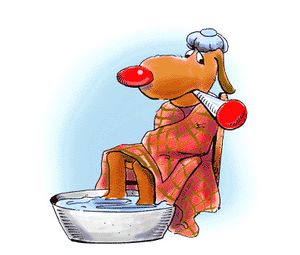Training for your dog: It's what the doctor ordered

Good training each day keeps the doctor away!
I'm not a physician, but if I were I wouldn't be shy about preaching the importance of personal, preventative health care, whether it brought me or cost me business. I guess that you would naturally expect any good doctor to encourage his or her patients to be proactive about maintaining good health! I am a dog trainer, and I would like to put in a plug for training your dog in this same vein.
Out of the estimated 63 million or so dogs owned as pets in the U.S, I would wager that only a very small percentage are ever trained to any speakable level of obedience. The huge inventory of available gadgets, equipment, classes, books and TV shows in some way seem to have resulted in the idea that “dog training” is something you buy, (over and over again) not something you do. It goes something like this...
The invisible fence keeps Rufus in the yard, the head halter keeps him on the leash, the baby gate keeps him in the laundry room, and my weekly class keeps me thinking we're getting somewhere. He can sit, shake, and wait for 30 seconds before getting his food. He loves to fetch but won't always bring back the ball, and if you tell him to come he will, as long as he's not interested in anything else. Oh, and he is prone to slipping out the front door for a jaunt from time to time but, he'll usually come back for a treat!
Similar to many of our own health afflictions, what may start out as a minor nuisance behavior can evolve into more radical or dangerous behaviors, like a poorly attended cold developing into pneumonia. If I were to diagnose the symptoms in the case of Rufus, I might say that this was a vulnerable system being held together with bandages and “temporary relief” medications. I would be concerned that it might grow into a more dire condition. And I would issue a prescription for training as a complete, long term cure. Then I would say...
Here's the good news!
Your condition has not yet become severe. It is likely that by adopting some healthful rituals and habits you can easily circumvent a prolonged illness. You would be surprised how accessible a more balanced state can be, just by making a few basic changes in your approach.
I'm inspired to continue by elaborating some general concepts that, I think, can help any dog owner keep training and obedience framed in a purposeful and positive perspective. Here's one more analogy:
Having grown up in Ann Arbor I've known a fair number of people over the years who have been involved with foreign exchange programs. Every family I know who has hosted a student in their home dedicated themselves to a few logical but vital steps for success.
-They prepared themselves in advance by researching and educating themselves about the country of origin, culture, language, cuisine and personal history of their guest.
-With this knowledge, they created a physical environment that was welcoming, understandable and safe.
-Then, they devoted time and attention to helping their guest understand our society and culture so he or she had freedom to explore in a safe and secure way.
If you were to imagine your dog as an exchange student then everything still applies, well, you know, dog way.
The third point, “helping their guest understand our society and culture so he or she had freedom to explore in a safe and secure way,” is the training part. This is how you should consider training, as a gift from you to your dog. I strongly believe that prioritizing “healthy” communication with our canine companions would result in the salvaging of a lot of innocent lives. To that end I propose that we all implement some straightforward and logical protocols regarding our canine relationships.
-First of all, keep the horse in front of the cart and educate yourself before you get a dog, not after he is already in your care (seems obvious?). Remember that your dog's breed is his culture, his genetic place of origin if you will. Learn about it! Even if your dog is a mixed breed, you can make an educated guess about his genetics with a good breed book and a little detective work.
-Maintain a home environment that is understandable and only “farm out” care if absolutely necessary.
-Lastly, put an upbeat spin on training and obedience: This isn't about limiting your dog, it's about opening doors for him. You can hire a trainer, go to a class, read a book or three — any of these may be a good idea. But any good trainer is going to say what the good doctor would say: “It's up to you to establish a healthy relationship.” Your dog being able to depend on a nurturing daily routine is like you eating your fruits and vegetables and exercising regularly. (Not to mention you can actually get your daily exercise while giving your dog his!)
I define training as a dedication to the development of an effective and reliable system of communication (language) — a system that enhances the level of freedom and security that you share with your dog.
I define obedience as a devotion to the adherence of boundaries and rules that preserve collective harmonyI prescribe a combination of both for a well-functioning canine immune system.
John Spieser is a professional dog trainer and owner of Dogheart. He can be reached at john@doghearta2.com.

